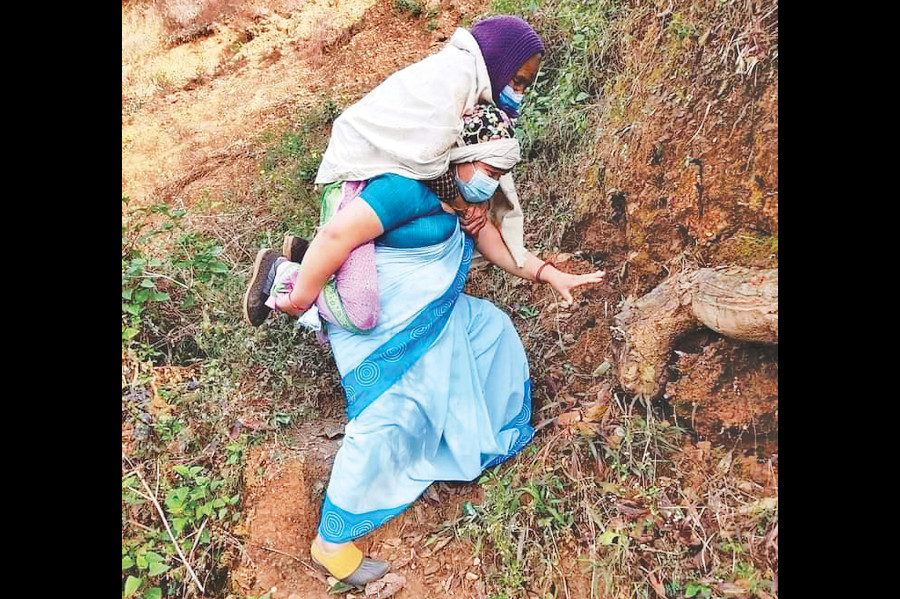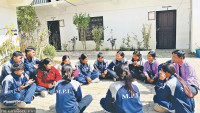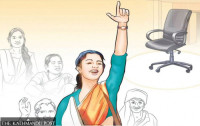National
A volunteer’s act earns praise but exposes health inequities in Nepal
An image of a woman carrying an elderly woman on her back for vaccination has gone viral. But it tells a bigger and darker story of the country’s health system, experts say.
Anup Ojha
Last Friday, an image of a woman carrying an elderly woman on her back made it to social media, quickly drawing a lot of attention, with users widely sharing the photo.
The colour of the sari—light blue with dark blue border—the woman carrying the old lady was wearing made it easy to figure out that she was a female community health volunteer. The image was from Gaudakot Ward 3 of Gulmi Durbar Rural Municipality in Gulmi.
She was Leela Thapa.
Thapa is seen climbing a steep trail giving a piggyback to Devi Kali Tandan, 78.
“I was taking her to the vaccination centre as she cannot walk,” Thapa told the Post over the phone. “She was initially reluctant to get vaccinated but when I told her that it would be difficult for her to get her senior citizen allowance and won’t be able to travel to meet her son, she agreed to get the jab.”
Thapa, 45, a female community health volunteer (FCHV), said that since there is no motorable road in the village, there was no option than to carry those who cannot walk when they need health care services.
Thapa is one of the 51,423 female community health volunteers, who are considered the backbone of Nepal's rural health services.
Thapa’s dedication won many hearts and earned praises from all walks of life.
“This powerful, moving image of a Female Community Health Volunteer carrying a 78-yr-old woman on her back to get a J&J COVID19 vaccine shows the strength of healthcare workers in this pandemic,” American Ambassador Randy Berry wrote on Twitter. “People like Leela Thapa are heroes who've selflessly worked to make sure we are safe.”
Pradeep Gyawali, a CPN-UML leader and former foreign minister, who hails from Gulmi, shared a post by Hamro Jubhung-Ramro Jubhung that read: “Respect for the woman volunteer who carried an eldelry women of Gaudakot of Gulmi for vaccination, where vehicles can’t reach because its geographical remoteness.”
Since the government initiated the Female Community Health Volunteer programme in 1988-89, these women have been a success story in Nepal for their relentless work in serving the community. Initially launched in 27 districts, the programme was later expanded to all the districts of the country.
In the initial days, their role was to support family planning, but their responsibility has been extended to health promotion (sanitation, nutrition, family planning, HIV, and maternal and child health), delivering health services (deworming, polio campaigns, and integrated management of childhood illnesses) and spreading other awareness programmes.
Thapa said she knew Tandan had not received the vaccine, but the problem was how to get her to the vaccination centre.
“I had carried four other eldelry people above 70 to the nearest health post for vaccination,” Thapa told the Post. “So I decided to carry Tandan too.”’
But underneath Thapa’s act of kindness and her service beyond the call of duty lies yet another sad reality. Even in the 21st century, a huge number of Nepalis do not have easy access to basic health care services.
The constitution has guaranteed free basic health services for every Nepali citizen, but there are thousands of citizens like Tandan who cannot reach their nearest health post to avail health care services.
Experts say that the viral image of a woman carrying another elderly woman on her back exposes how accessible Nepal’s health care services are.
“In some places, female community health volunteers are carrying people to the vaccination centres and in others, people are carrying their old parents or relatives to the immunisation centres,” said Dr Kiran Regmi, former Secretary for Health. “The message is clear—that our healthcare facilities are not accessible to all.”
Nepal has already marked the first anniversary of the launching of its vaccination drive. As of Thursday, half of the population still needs to get fully vaccinated.
“The simplest way to make vaccines available to all is making health care facilities accessible to all,” said Regmi. “Our responsibility will not be over by only praising Leela Thapa’s work. By carrying an elderly woman to the vaccination centre, she actually exposed Nepal’s healthcare reach.”
Volunteers like Thapa for long have been serving the communities, but with added work, lately they have been overburdened. They say they have been working for a meagre remuneration for years.
They receive an annual allowance of Rs 10,000 for uniform, and Rs 1,200 for transportation expenses and are given Rs400 for any meetings or programmes.
Indira Bagale, 50, who has been working as a female community health worker in Madhya Nepal Municipality in Lamjung for the past three decades said the government has increased her duty but the allowance is too little.
“We work as all-rounders… we have to reach where there’s no health facility,” Bagale told the Post over the phone from Madhya Nepal-3 . “We have to work and we do, rain or shine, and we believe it’s our duty to serve the people.”
Public health experts say the contributions of female community health volunteers have been immense in Nepal.
“What Leela Thapa did is a spontaneous act of kindness and it can be taken as an anecdote of how dedicated our health volunteers are but they are not public health workers. They are just a bridge between community and nation’s health system,” said Dr Madhu Dixit, a professor at the Tribhuvan University’s Institute of Medicine and a public health expert.
“This time Leela is taking the old lady for vaccination. But it’s the state that should have ensured how a maximum number of people can be covered. No doubt our female community health volunteers have done and been doing a great job… sometimes crossing swollen rivers with vaccines and other times carrying the people to vaccination centres.”
Dr Rita Thapa, a senior public health expert, said that the picture of Leela Thapa carrying the elderly woman tells a lot about Nepal’s harsh reality.
“This saddened me a lot,” said Thapa. “What if the woman had fallen down or was injured? I felt proud of these volunteers, but I also felt how overburdened such a crucial link in our health system is.”
Rita Thapa has a deep connection with the Female Community Health Volunteer programme, as she is one of the pioneers of the programme in Nepal.
“It started as a pilot project but then became immensely successful as FCHVs became a bridge to fill the gap in our health system,” Thapa told the Post. “But despite FCHVs’ immense contributions, the government over the years has failed to bring them into the system and failed to provide them with basic benefits.”
Volunteers like Leela Thapa may have some qualms but not much complaint. They do expect there should be some incentives for them to continue their work, but they said they are not going to stop working.
“Everyone I find in trouble or in need of help, I help them as my own… whenever I see anyone in need of health services, I do my best,” said Leela Thapa. “My duty is to serve the people… the community.”
(Arjun Poudel contributed reporting.)




 16.4°C Kathmandu
16.4°C Kathmandu.jpg)














